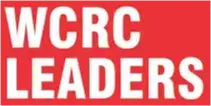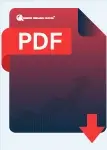Jet Lag Therapy Treatment Market Overview
As per MRFR analysis, the Jet Lag Therapy Treatment Market Size was estimated at 2.07 (USD Billion) in 2024. The Jet Lag Therapy Treatment Market Industry is expected to grow from 2.18 (USD Billion) in 2025 to 3.52 (USD Billion) till 2034, at a CAGR (growth rate) is expected to be around 5.48% during the forecast period (2025 - 2034).
Key Jet Lag Therapy Treatment Market Trends Highlighted
The Jet Lag Therapy Treatment Market is experiencing significant growth due to several key market drivers. Increasing air travel, particularly international flights, has raised awareness about the impact of jet lag on travelers’ health and productivity. As more people travel across different time zones for business or leisure, the demand for effective jet lag solutions has surged. Additionally, advancements in technology and the development of innovative treatments, such as light therapy, supplements, and wearable devices, are enhancing the market's appeal. The growing focus on wellness and preventive healthcare is also propelling interest in managing jet lag as consumers seek options that promote their overall well-being during travel.Within this evolving landscape, there are ample opportunities to be explored and captured. Companies can innovate by creating personalized treatment plans leveraging data analytics to cater to the unique needs of frequent travelers. The integration of travel industry partnerships, including airlines and hotels, could also facilitate the promotion and adoption of jet lag therapies. As the awareness of circadian rhythms grows, products that offer natural solutions may resonate well with consumers looking for safer, drug-free alternatives. Expanding into emerging markets with a rising class of travelers presents another avenue for growth as these regions embrace global connectivity and international travel.Recent trends indicate an increase in mobile applications and wearable technology focused on managing sleep patterns and circadian rhythm adjustments. This shift towards digital solutions highlights a change in consumer preference, emphasizing convenience and instant access to jet lag therapy options. Furthermore, there is a noticeable rise in online information-sharing platforms that educate travelers about the effects of jet lag and effective coping strategies. This growing emphasis on understanding travel-related health challenges reflects a more informed consumer base that is keen on exploring avenues for better travel experiences.
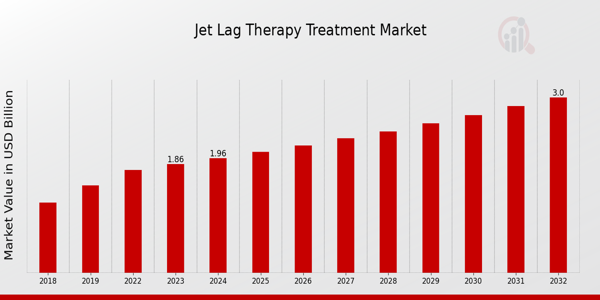
Source: Primary Research, Secondary Research, MRFR Database and Analyst Review
Jet Lag Therapy Treatment Market Drivers
Increasing Global Travel and Tourism
The rising trend of globalization has significantly increased the number of international travelers, contributing to the demand for effective jet lag therapy treatment. With more people traveling for business or leisure, the challenges associated with crossing multiple time zones have become increasingly prevalent. The exhaustion and fatigue caused by jet lag can adversely affect productivity and overall well-being, especially for frequent flyers.As the Jet Lag Therapy Treatment Market industry continues to evolve, more travelers are seeking solutions to minimize the impact of jet lag on their bodies. This trend is accompanied by a growing awareness of various treatment options, ranging from natural remedies to pharmaceutical solutions that help regulate sleep patterns. Additionally, airlines and travel agencies are beginning to recognize the importance of passenger well-being, prompting them to endorse or provide awareness about jet lag treatments to enhance travel experiences.With these developments, the Jet Lag Therapy Treatment Market is poised for substantial growth as innovative therapies and methodologies continue to emerge, aimed at alleviating the discomfort associated with long-haul flights and facilitating a quicker adjustment to new time zones. As awareness increases, the treatment landscape is further enriched by the introduction of personalized therapies based on individual responses to jet lag, creating multiple avenues for expansion in the market.
Growing Awareness of Health and Wellness
In today's fast-paced world, there is an increasing focus on health and wellness, driving individuals to seek effective solutions for conditions like jet lag. This heightened awareness is encouraging more people to prioritize their well-being while traveling, which in turn is fueling growth in the Jet Lag Therapy Treatment Market industry. Consumers are now more informed about the potential impact of time zone changes on their health and are actively looking for therapies that can mitigate these effects.As a result, the demand for specific treatments, including herbal supplements, sleep aids, and behavioral therapies, is on the rise, presenting numerous opportunities for market players to innovate and cater to these evolving consumer needs.
Advancements in Technology and Treatment Options
The Jet Lag Therapy Treatment Market industry is witnessing rapid advancements in technology that are revolutionizing the way jet lag is treated. With the development of wearable devices and mobile applications that monitor sleep patterns and offer personalized treatment plans, travelers can now effectively manage their jet lag symptoms. These technological innovations are making jet lag therapy more accessible and tailored to individual needs, leading to an increase in their adoption among frequent travelers.Furthermore, ongoing research into the biological mechanisms of sleep and circadian rhythms is helping to enhance the efficacy of existing treatments, propelling the market forward with new and improved solutions.
Jet Lag Therapy Treatment Market Segment Insights:
Jet Lag Therapy Treatment Market Treatment Type Insights
The Jet Lag Therapy Treatment Market has been segmented by Treatment Type, which includes Medication, Light Therapy, Cognitive Behavioral Therapy, and Supplementation. In 2023, the overall market was valued at 1.86 USD Billion, indicating a growing awareness and necessity for effective jet lag solutions. Among the various treatments, Medication holds a majority share with a valuation of 0.74 USD Billion in 2023 and is projected to rise to 1.15 USD Billion by 2032. This prominence suggests that many individuals still rely on pharmacological options to alleviate jet lag symptoms, indicating a significant demand for these products in the global market.Light Therapy, which was valued at 0.52 USD Billion in 2023 and is expected to reach 0.81 USD Billion by 2032, plays a crucial role as a non-invasive treatment that helps regulate sleep patterns by exposing individuals to specific wavelengths of light. This method is particularly appealing to those seeking alternative solutions without the side effects of medication. Cognitive Behavioral Therapy (CBT), valued at 0.4 USD Billion in 2023, is gaining importance as a psychological approach to change the way individuals think about and cope with jet lag, with an expected increase to 0.63 USD Billion by 2032.As more travelers recognize the mental aspects of jet lag, CBT is projected to grow, influencing the market dynamics positively. Supplementation, while the least dominant treatment option, valued at 0.2 USD Billion in 2023, showcases a steady growth potential to 0.31 USD Billion by 2032, indicating a shift towards natural and holistic approaches to managing travel fatigue. Potential growth drivers include an increase in international travel, heightened awareness of the impacts of jet lag, and the rising popularity of wellness trends that favor non-pharmaceutical strategies.The holistic treatments are gaining traction, although they represent a smaller share of the market compared to medication. Overall, the Jet Lag Therapy Treatment Market segmentation highlights the diverse range of approaches to combat jet lag, reflecting changing consumer preferences and the treatment's significant value in an increasingly mobile society.
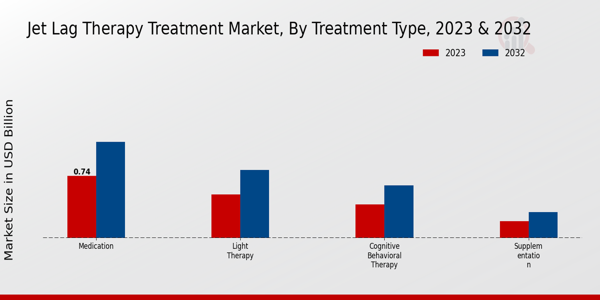
Source: Primary Research, Secondary Research, MRFR Database and Analyst Review
Jet Lag Therapy Treatment Market Distribution Channel Insights
The Jet Lag Therapy Treatment Market shows diverse opportunities across its Distribution Channel segment, which is instrumental in the delivery of effective treatment solutions. In 2023, the overall market was valued at 1.86 billion USD, showcasing its relevance in modern society as travel becomes more prevalent. Online pharmacies are increasingly significant due to their convenience and broader reach, making them a preferred choice for many consumers seeking jet lag treatments. Retail pharmacies also play a vital role, often being the first point of contact for consumers looking for immediate remedies.Hospitals contribute to the market by offering specialized treatments and consultations, while wellness centers focus on holistic approaches to jet lag therapy, thus capturing a niche audience seeking preventive and comprehensive care. The interplay between these distribution channels highlights the market's adaptive nature, driven by changing consumer preferences and healthcare trends. The growth in e-commerce and increased accessibility of wellness services present considerable opportunities for expansion in the Jet Lag Therapy Treatment Market, as demonstrated by changing consumer behaviors and the rise of integrated health solutions.
Jet Lag Therapy Treatment Market End User Insights
The Jet Lag Therapy Treatment Market is seeing significant growth, with a market value reaching 1.86 USD Billion in 2023. This market is primarily driven by diverse end users, including business travelers, tourists, students, and frequent flyers, each contributing to the demand for effective jet lag solutions. Business travelers represent a major group that often faces irregular travel schedules and perceive jet lag as a disruption to productivity, making them a key factor influencing market trends. Tourists, on the other hand, seek enjoyable travel experiences without the burden of fatigue from long-distance flights, thus creating substantial market opportunities.Students, particularly those studying abroad or participating in international programs, also contribute notably, as their travel often involves crossing time zones. Frequent flyers, frequently exposed to varying time zones, have a continued need for effective remedies, thus dominating the market due to their recurring travel schedules. Overall, the distinct needs and behaviors of these end users underscore their significance in shaping the landscape of the Jet Lag Therapy Treatment Market. With growing awareness and acceptance of various therapy options, the market is poised for further expansion leading up to 2032.
Jet Lag Therapy Treatment Market Formulation Insights
In 2023, the Jet Lag Therapy Treatment Market was valued at 1.86 USD Billion, with the Formulation segment playing a significant role in this growth. This segment encompasses various forms, including Tablets, Gels, Sprays, and Capsules, which cater to diverse consumer preferences and needs for relieving jet lag symptoms. Tablets, known for their convenience and dosage accuracy, are widely utilized, while Gels and Sprays provide rapid absorption and onset of action, appealing to travelers seeking immediate relief. Capsules, often favored for their ease of use and portability, contribute notably to the market dynamics.With advancements in formulation technology, these products are evolving, leading to improved efficacy and user experiences. The Jet Lag Therapy Treatment Market revenue reflects a growing awareness of jet lag impacts on travel, which, combined with increasing global travel, fuels the industry. However, challenges such as regulatory hurdles and market competition persist. Opportunities lie in the development of innovative formulations and personalized therapies, which can enhance treatment effectiveness for users. Thus, the formulation segment, with its varied offerings, is crucial to the market growth and aligns with the evolving lifestyles of modern travelers.
Jet Lag Therapy Treatment Market Regional Insights
The Jet Lag Therapy Treatment Market is segmented regionally, showcasing diverse growth across various areas. In 2023, North America will lead this market with a valuation of 0.8 USD Billion, expected to reach 1.26 USD Billion by 2032, highlighting its dominance due to increased air travel and a rising awareness of jet lag treatment options. Europe follows with a valuation of 0.5 USD Billion in 2023, anticipated to grow to 0.9 USD Billion in 2032, driven by high disposable incomes and a robust healthcare system, which supports a significant market.The APAC region represents a growing sector with a value of 0.36 USD Billion in 2023 and is expected to reach 0.63 USD Billion by 2032, driven by expanding international travel and tourism, particularly in countries like China and India. South America and MEA are smaller markets, valued at 0.1 USD Billion and 0.1 USD Billion in 2023, respectively, with South America projected to grow to 0.15 USD Billion and MEA slightly decreasing to 0.06 USD Billion by 2032, suggesting a limited but steady market presence. The varying valuations reflect regional travel habits, healthcare accessibility, and cultural attitudes toward jet lag treatment, which ultimately shape the Jet Lag Therapy Treatment Market revenue dynamics.
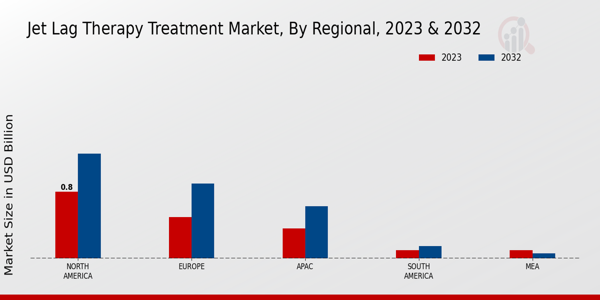
Source: Primary Research, Secondary Research, MRFR Database and Analyst Review
Jet Lag Therapy Treatment Market Key Players and Competitive Insights:
The Jet Lag Therapy Treatment Market has been increasingly gaining attention due to the rising number of air travelers and the significant impact of jet lag on their health and well-being. As globalization and international travel continue to expand, the need for effective solutions to combat jet lag becomes paramount. This market comprises various therapeutic options designed to alleviate the symptoms of jet lag, including nutritional supplements, cognitive behavioral therapies, pharmaceutical drugs, and lifestyle adjustment programs. The competitive landscape in this sector features a multitude of players striving to differentiate their offerings through innovation and efficacy while adhering to regulatory standards. The intensity of competition prompts these companies to invest in research and development, aiming to enhance their product portfolios and improve consumer satisfaction.Cogniflex stands out in the Jet Lag Therapy Treatment Market due to its unique formulation that blends natural ingredients aimed at improving sleep quality and minimizing the effects of time zone changes. The company has successfully positioned itself as a brand that prioritizes cognitive function and overall brain health, making it a preferred choice for consumers seeking non-pharmaceutical solutions. The strengths of Cogniflex lie in its emphasis on scientifically-backed ingredients, which attract health-conscious consumers looking for evidence-based products. Additionally, the brand has developed a strong online presence and is adept at utilizing digital marketing strategies to engage with its audience effectively. This approach not only enhances brand visibility but also fosters customer loyalty, as users often return for products they trust. The company's dedication to continuous improvement and adaptation to market trends further solidifies its position within the sector.Nature's Bounty has carved a significant niche in the Jet Lag Therapy Treatment Market with its wide array of natural dietary supplements specifically targeting sleep enhancement and jet lag recovery. The company's strength lies in its established reputation for quality and efficacy, as it utilizes high-quality ingredients that resonate well with its target demographic. Nature's Bounty leverages its strong distribution networks, making its products widely accessible through pharmacies, health food stores, and online retailers. Furthermore, the brand has invested in consumer education efforts, providing insights into the importance of sleep and recovery in maintaining overall health. This educational focus not only positions Nature's Bounty as an authority in wellness but also enhances trust with consumers. Additionally, the commitment to sustainable practices and transparency in sourcing ingredients aligns with current consumer trends advocating for environmental responsibility, helping the company to maintain a leading position in the competitive landscape of jet lag therapies.
Key Companies in the Jet Lag Therapy Treatment Market Include:
- Cogniflex
- Nature's Bounty
- Rejuuvenate
- GNC Holdings
- Rugby Laboratories
- CuraMed
- Circadian Optics
- Nutraceutical
- Melatonin
- ZzzQuil
- Himalaya Wellness
- Life Extension
- Sleep Number
- Natural Vitality
Jet Lag Therapy Treatment Market Industry Developments
The Jet Lag Therapy Treatment Market has witnessed significant developments recently, particularly with innovations and strategic movements among key players. Companies such as Cogniflex, Nature's Bounty, and GNC Holdings have been focusing on enhancing their product offerings aimed at improving sleep quality and reducing symptoms of jet lag. Notably, the demand for melatonin-based products, including those from Melatonin and ZzzQuil, continues to grow as travelers seek effective solutions. In terms of mergers and acquisitions, recent activity includes collaborations and strategic alliances aiming to broaden market reach and enhance product portfolios. Companies like Rejuuvenate and Rugby Laboratories are also exploring partnerships to leverage distribution networks. The overall market valuation is experiencing growth, driven by increasing traveler numbers and heightened awareness regarding sleep health. This growth impacts the market by intensifying competition and encouraging innovation in formulations and delivery methods across brands like Circadian Optics, Himalaya Wellness, and Natural Vitality. As the focus on wellness and holistic remedies rises, the landscape of the jet lag therapy treatment market is poised for continued evolution.
Jet Lag Therapy Treatment Market Segmentation Insights
- Jet Lag Therapy Treatment Market Treatment Type Outlook
- Medication
- Light Therapy
- Cognitive Behavioral Therapy
- Supplementation
- Jet Lag Therapy Treatment Market Distribution Channel Outlook
- Online Pharmacy
- Retail Pharmacy
- Hospitals
- Wellness Centers
- Jet Lag Therapy Treatment Market End User Outlook
- Business Travelers
- Tourists
- Students
- Frequent Flyers
- Jet Lag Therapy Treatment Market Formulation Outlook
- Tablets
- Gels
- Sprays
- Capsules
| Report Attribute/Metric |
Details |
|
Market Size 2024
|
2.07 (USD Billion)
|
|
Market Size 2025
|
2.18 (USD Billion)
|
|
Market Size 2034
|
3.52 (USD Billion)
|
|
Compound Annual Growth Rate (CAGR)
|
5.48 % (2025 - 2034)
|
|
Report Coverage
|
Revenue Forecast, Competitive Landscape, Growth Factors, and Trends
|
|
Base Year
|
2024
|
|
Market Forecast Period
|
2025 - 2034
|
|
Historical Data
|
2020 - 2024
|
| Market Forecast Units |
USD Billion |
| Key Companies Profiled |
Cogniflex, Nature's Bounty, Rejuuvenate, GNC Holdings, Rugby Laboratories, CuraMed, Circadian Optics, Nutraceutical, Melatonin, ZzzQuil, Himalaya Wellness, Life Extension, Sleep Number, Natural Vitality |
| Segments Covered |
Treatment Type, Distribution Channel, End User, Formulation, Regional |
| Key Market Opportunities |
Growing demand for natural remedies, Rising awareness of sleep health, Increased air travel post-pandemic, Development of wearable tech solutions, Innovative digital health platforms |
| Key Market Dynamics |
Increasing travel frequency, Growing awareness of jet lag, Development of innovative therapies, Demand for natural remedies, Rising healthcare expenditure |
| Countries Covered |
North America, Europe, APAC, South America, MEA |
Frequently Asked Questions (FAQ) :
The expected market size of the Jet Lag Therapy Treatment Market in 2034 is 3.52 USD Billion.
The projected CAGR for the Jet Lag Therapy Treatment Market from 2025 to 2034 is 5.48%.
North America is expected to dominate the Jet Lag Therapy Treatment Market by 2032, valued at 1.26 USD Billion.
The market size for the Medication segment in 2023 is valued at 0.74 USD Billion.
The Light Therapy segment is expected to reach a market value of 0.81 USD Billion by 2032.
Key players in the market include Cogniflex, Nature's Bounty, GNC Holdings, and Sleep Number.
The Cognitive Behavioral Therapy segment is expected to be valued at 0.63 USD Billion in 2032.
The projected market size for the APAC region in 2032 is 0.63 USD Billion.
In 2023, the Supplementation treatment type had the smallest market share valued at 0.2 USD Billion.
The expected market size for South America in 2032 is 0.15 USD Billion.

